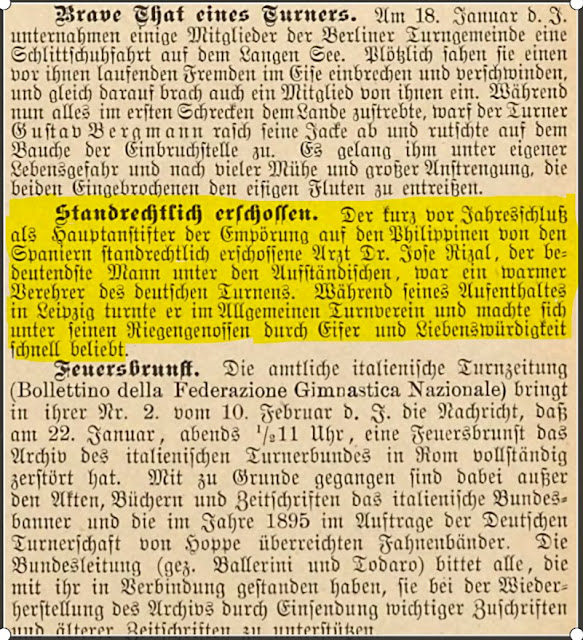Tribute to Jose Rizal by German Gymnastics- January 1897
 |
| The tribute to Rizal of "Deutsche Turnblätter" |
In an article dated January 1897 of "Deutsche Turnblätter," a monthly publication devoted to the propagation of German Gymnastics (exercise and sports), there is a tribute to Dr. Jose Rizal.
The article writes:
"Der kurz vor Jahresschluss als Hauptanstiffter der Empörung auf den Philippinen von den Spanien standreclich erchossene Arzt Jose Rizal der bedeustende unter den Aufstandischen, war ein warmer Verehrer des deutschen Turnens . Wahrend seines Aufethaltes in Leipzig turnte er im Allgeneinen Turnverein und machte sich unter seinen Riegengenossen durch Eifer und Liebenswurdigkeit schnell beliebt."
Translation:
"Jose Rizal, the prominent figure among the insurgents who was executed by the Spanish authorities just before the end of the year, was a fervent admirer of German gymnastics. During his stay in Leipzig, he exercised at the gymnastics club and quickly endeared himself to his comrades in the said club through his enthusiasm and kindness."
Jose Rizal spent two and a half months in Leipzig from August to October 1886, immersing himself in German writings about the Philippines and meeting prominent figures in geography and anthropology, such as Professor Hans Meyer and Friedrich Ratzel. Remarkably, Rizal also found time to engage in physical activities, visiting a local gymnastics club and demonstrating his dedication as a true fitness enthusiast. However, what stands out most in the article is the recognition of his virtues—"Eifer und Liebenswürdigkeit" (enthusiasm and kindness). These qualities were observed by many foreigners who had the opportunity to meet him. Notably, even the German gymnastics community acknowledged and admired these exceptional traits in him.
The German word "turnen" translates to "to do gymnastics," and it encompasses a variety of disciplines and bodily exercises aimed at improving physical fitness. In 19th-century Germany, gymnastics was seen as a means of achieving physical conditioning and was incorporated into the general education of young people. This concept laid the groundwork for what we now recognize as physical education (P.E.).
Johann Friedrich Ludwig Christoph Jahn (1778–1852) is often regarded as the father of German gymnastics. As a Prussian educator and former military officer, Jahn believed that a fit and strong citizenry was essential for the survival of the state, particularly in times of war. He developed a system of training and education that emphasized the physical well-being of students, reflecting his vision of cultivating a robust and capable populace.
The Latin phrase "Mens sana in corpore sano," which translates to "a healthy mind in a healthy body," captures a profound concept that became particularly relevant in mid-19th century Europe. During this period, there was a growing recognition of the importance of integrating physical exercise into mental and intellectual pursuits. This holistic approach emerged from the belief that true health encompasses not just mental acuity but also physical well-being. By emphasizing the interconnectedness of mind and body, individuals sought to achieve a more balanced and comprehensive state of fitness, thereby defining a new standard for overall health.
This philosophy also resonated with José Rizal. During his exile in Dapitan in 1892, Rizal established a school for young boys that incorporated physical exercise as a fundamental component of his educational system. His commitment to this holistic approach demonstrated his belief in the importance of nurturing both the mind and body, aligning with the broader European trend of the time.
 |
| Scenes from the foundation day of the Leipzig General Gymnastics Club in 1895 (drawing by A. Liebing) |

.png)


Comments
Post a Comment